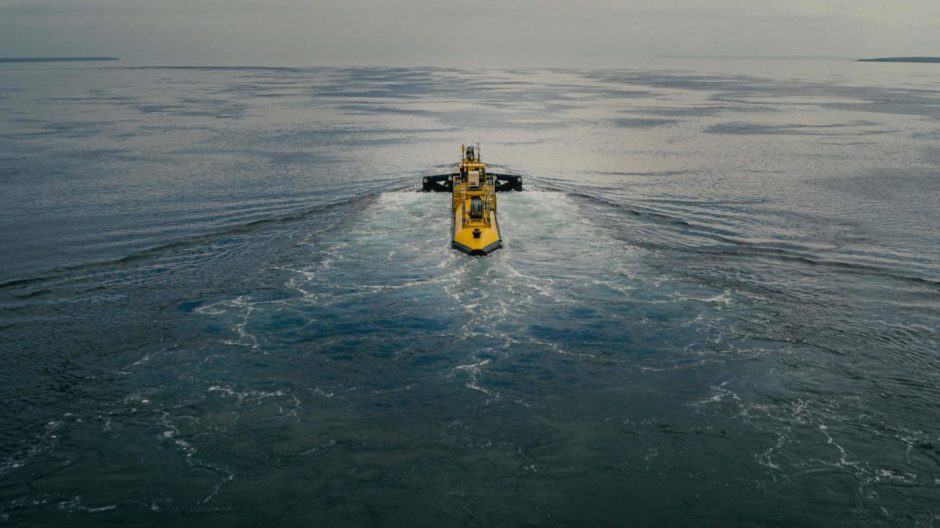
A COP26 fringe event saw wave and tidal energy firms praise Scottish government support for the sector, but call for greater certainty to enable commercialisation.
Speaking at an event hosted by the Scottish Government and Scottish Enterprise as part of ‘Scotland’s Climate Ambition Zone’ during the UN Summit in Glasgow, UK marine energy developers were optimistic about deploying commercial devices by 2030, but urged government to offer similar support frameworks as have been seen for other renewable technologies.
Chairing a panel session on marine energy, Scottish Renewables chief executive Clare Mack said: “We essentially want the same opportunity that other technologies have had, which is to demonstrate their ability to reduce costs and their ability to integrate themselves within a broader energy mix.”
Government estimates have suggested a combination of wave and tidal energy has the potential to deliver around 20% of the UK’s total electricity needs, from installed capacity of around 30–50 gigawatts (GW).
Ms Mack recalled difficult conversations with government four years ago, when Prime Minister Theresa May’s administration halted new renewables subsidies and closed the Renewables Obligation. However, she noted recent moves had been more constructive for marine technology developers.
“I accept that we’ve probably not got everything we would want in the toolkit at this point in time but certainly to have seen recognition within the Contract for Difference [CfD] mechanism, for example, that wave and tidal will have a place is really pleasing, and we’re really keen to build on that at a Scottish level,” she said.
Aside from energy generation, she also highlighted the opportunities available from the data and research gathered in Scotland and the UK, a local supply chain and the regulatory framework put in place, thanks in part to sites such as the European Marine Energy Centre (EMEC) on Orkney and the Perpetuus Tidal Energy Centre (PTEC) in the Isle of Wight.
Andrew Scott, CEO of Orbital Marine Power, said his company was now at the “start line of the commercialisation process” but also called for further clarity to make sure marine opportunities could be realised.
“What we really need right now is some leadership and vision around creating those early commercial steps for industry that build out and gather investor confidence,” he said.
Orbital Marine recently deployed “the world’s most powerful” tidal turbine at EMEC. The 2-MW, 74 m-metre floating device is expected to operate for the next 15 years, and will be capable of meeting the energy demands of around 2,000 UK homes.
Mr Scott cited “a huge amount of investor interest” in the marine energy space, both from those looking to invest in technologies and those looking for ESG-aligned equity investments.
“But it does all need to be underpinned by an ability for people to make money, and that means we need to be afforded the same opportunity that every other renewable technology has had previously,” he said.
Graham Reed, CEO of SIMEC Atlantis Energy, the developer of the MeyGen tidal array, said UK industry had 124 MW of capacity “ready to go now” but that it would need government support for construction.
Key to these projects will be the upcoming CfD Allocation Round 4 (AR4). Draft strike prices for projects brought online between 2025-27 were published in September, with rates for tidal stream projects set at £211/MWh and wave at £258/MWh.
Marine energy developers have called for a minimum of 100 MW of capacity to win support to ensure momentum within the sector.
The CfD round is set to open in mid-December 2021.
Simon Grey, chief executive of wave energy developer AWS Ocean Energy, was optimistic that engineering challenges could be overcome in the coming years, but stressed the importance of these support frameworks to make sure the sector could grow.
“That’s the key step… The first country that steps up with a tariff for wave energy that makes wave energy affordable will be the country which corners wave energy technology through the next stage, and the British Government needs to recognise that, we need to get that support in place,” he said.
“With that in place, that will dictate what we do for the next five years.”
Recommended for you

 © Andrew Dykes/DCT Media
© Andrew Dykes/DCT Media